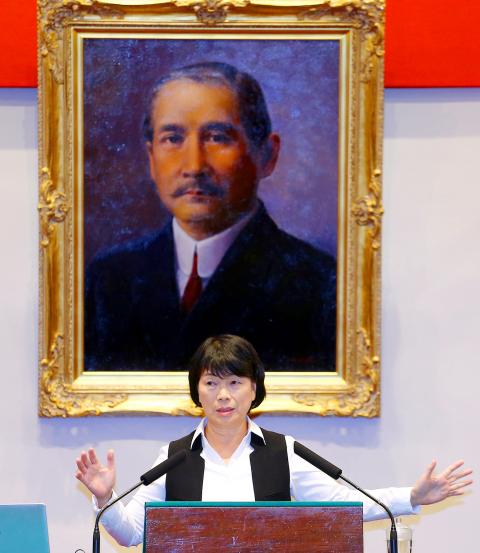In honor of the birthday of Republic of China (ROC) founding father Sun Yat-sen (孫逸仙) yesterday, Minister of Culture Lung Ying-tai (龍應台) was invited to give a presentation on the chaotic era that prevailed at that time at a commemorative event organized by the government.
Lung said she had originally planned for her speech to be titled “1912,” but had second thoughts as the day for the speech grew nearer.
“I started to think that the title was too grand because 1912 is a period that could talk about for three days and three nights without event getting close to finishing it,” Lung said.

Photo: CNA
Lung said she decided to change the title of the speech to “The Man Called Sun Yat-sen,” but after texting the title to Presidential Office Secretary-General Timothy Yang (楊進添) she again had second thoughts.
“I was worried that he would be furious because the title wasn’t respectful enough,” Lung said, adding: “I was very surprised when he didn’t react that way.”
“Then I got to thinking that what I really wanted to talk about was the era, the atmosphere of the time, the feelings of the epoch,” Lung said, adding that she was not a specialist on Sun Yat-sen.
Lung said she later decided to finalize the title as “1912” to better share her observations of that era.
The minister said that although she had given many speeches since she was 18, “This is probably the most special event at which I have been asked to speak.”
The event was called “Central Commemoration and Celebration for Chunghua Cultural Revitilization,” and Lung said “just looking at the two Chinese characters for ‘central’ (中樞) was enough to make her ‘dizzy.’”
The minister said she was uncomfortable about the seriousness of the event and recalled that US author Mark Twain’s trick for diffusing a serious situation in his writing was to introduce a small dog into the scene as comic relief. However, Lung said she did not know how she would achieve the same levity.
Sun was a great idealist, though his ideals had been somewhat impractical and illusory for his time, the Chinese-language United Daily News quoted Lung as saying.
The ROC has continued in the steps of Sun’s dreams and ideals for the past century, she said.
Pointing out that exactly one century has passed since the ROC was founded, Lung sought to depict for her audience the modernization of China over the past century as seen through the eyes of Sun, Jeme Tienyow (詹天佑) — a Qing-dynasty official who helped build the first modern Chinese railway — and Wu Liende (伍連德), a Nobel prize nominee in medicine.
Pointing to a comic strip published by a French magazine at the time, which depicted a big cake with the French word for China written on it and a Qing Dynasty official crying “No! Don’t do that,” Lung said the cartoon adequately portrayed the helplessness with which China had watch its territory be divided at the time.
Most of the 19th century saw China being splintered and fragmented by European and US colonialism, Lung said, adding that the divisions did not start to subside until 1910.
Citing Sun’s failed plan to build more than 160,000km of railway, Lung said that the founding father’s plans had laid down the groundwork for the modernization of China, even if the goals had been too grandiose and unreachable during his time.
Additional reportiong by Jake Chung

The Coast Guard Administration (CGA) yesterday said it had deployed patrol vessels to expel a China Coast Guard ship and a Chinese fishing boat near Pratas Island (Dongsha Island, 東沙群島) in the South China Sea. The China Coast Guard vessel was 28 nautical miles (52km) northeast of Pratas at 6:15am on Thursday, approaching the island’s restricted waters, which extend 24 nautical miles from its shoreline, the CGA’s Dongsha-Nansha Branch said in a statement. The Tainan, a 2,000-tonne cutter, was deployed by the CGA to shadow the Chinese ship, which left the area at 2:39pm on Friday, the statement said. At 6:31pm on Friday,

The Chinese People’s Liberation Army Navy’s (PLAN) third aircraft carrier, the Fujian, would pose a steep challenge to Taiwan’s ability to defend itself against a full-scale invasion, a defense expert said yesterday. Institute of National Defense and Security Research analyst Chieh Chung (揭仲) made the comment hours after the PLAN confirmed the carrier recently passed through the Taiwan Strait to conduct “scientific research tests and training missions” in the South China Sea. China has two carriers in operation — the Liaoning and the Shandong — with the Fujian undergoing sea trials. Although the PLAN needs time to train the Fujian’s air wing and

The American Institute in Taiwan (AIT) put Taiwan in danger, Ma Ying-jeou Foundation director Hsiao Hsu-tsen (蕭旭岑) said yesterday, hours after the de facto US embassy said that Beijing had misinterpreted World War II-era documents to isolate Taiwan. The AIT’s comments harmed the Republic of China’s (ROC) national interests and contradicted a part of the “six assurances” stipulating that the US would not change its official position on Taiwan’s sovereignty, Hsiao said. The “six assurances,” which were given by then-US president Ronald Reagan to Taiwan in 1982, say that Washington would not set a date for ending arm sales to Taiwan, consult

A Taiwanese academic yesterday said that Chinese Ambassador to Denmark Wang Xuefeng (王雪峰) disrespected Denmark and Japan when he earlier this year allegedly asked Japan’s embassy to make Taiwan’s representatives leave an event in Copenhagen. The Danish-language Berlingske on Sunday reported the incident in an article with the headline “The emperor’s birthday ended in drama in Copenhagen: More conflict may be on the way between Denmark and China.” It said that on Feb. 26, the Japanese embassy in Denmark held an event for Japanese Emperor Naruhito’s birthday, with about 200 guests in attendance, including representatives from Taiwan. After addressing the Japanese hosts, Wang